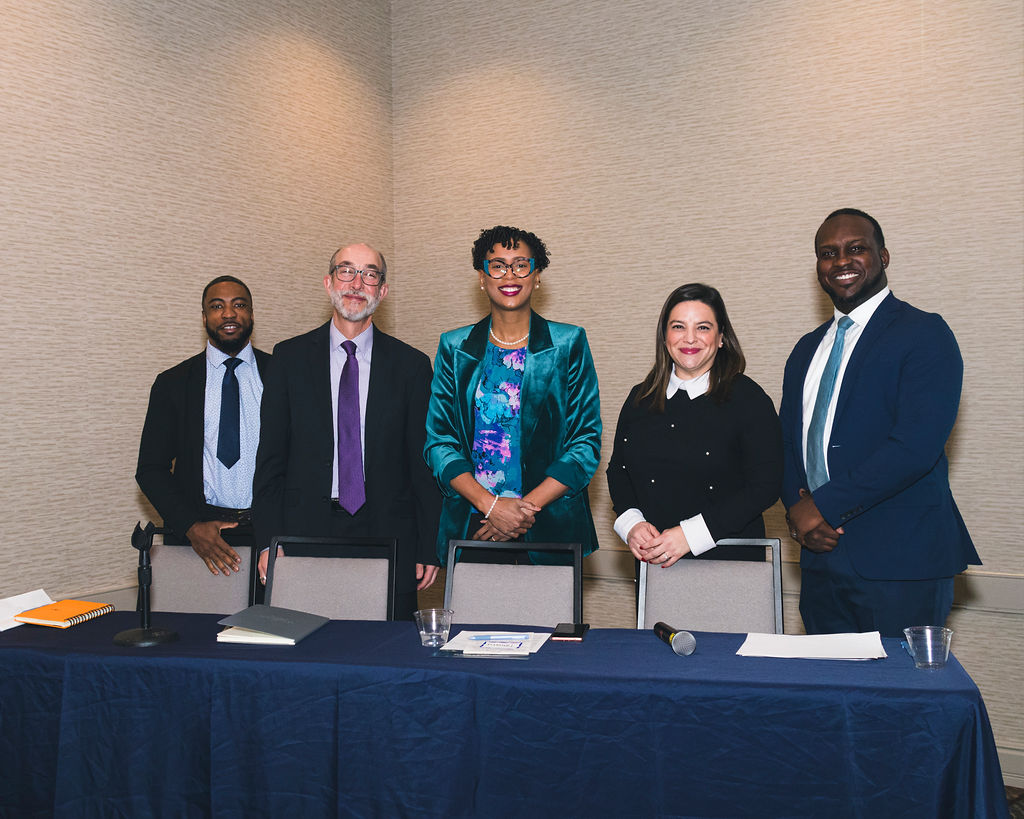As part of its ongoing effort to build a community of advocates across the state, the Coalition for Transforming Higher Education Funding held its final community conversation event of the year at the Southwest Marriott in Burr Ridge, Ill.
Led by the Partnership for College Completion (PCC), the event focused on how advocates and higher education professionals can move forward with their efforts to ensure every student has what they need to succeed and thrive throughout their college experience following the Supreme Court’s decision to strike down affirmative action.
PCC Senior Director of College and University Partnerships Dr. Claudia Mercado kicked off the event with an overview of the history of higher education in the United States.
“When we know the context and history of higher education, we realize it was not created for many of us in this space,” Dr. Mercado said, describing how over 400 years of systemic racism had directly led to the inequity seen across campuses today.
Following remarks from Dr. Mercado, PCC Director of Policy and Advocacy Christian Perry moderated a panel of education and equity advocates who discussed how their organizations responded to the Supreme Court decision.

“We knew the decision was coming. Our focus was to reassure our scholars that they are worthy, that they belong, and that they should not change their approach to their college decision because of the ruling,” said Dr. Tamara Hoff Pope, Director of Higher Education Policy at Chicago Scholars.
Latino Policy Forum’s Director of Higher Education Policy Jennifer Juarez emphasized having conversations about what it means to be student-ready and intentionally foster success.
“You’re enrolling students at these institutions, but what does it mean to serve our students and help them go onto careers or graduate school?” Juarez said.
Panelists also urged institutions to recruit from high schools in low-income communities and consider test-blind admissions.
Following the panel of experts, which also included Dominque Wilson and Dr. Robert McBride Jr., PCC Equity Program Manager Mercedes Terrazas led a student panel that featured two graduate and two undergraduate students.
The students shared their experiences on campus post affirmative action as well as some of the advice they have for higher education professionals to help better serve students like themselves.
Karlie Sanchez, a graduate student at the University of Illinois at Chicago, said that the decision on affirmative action made it hard to keep faith in the higher education system overall.

“Being a student leader on campus was really important. When this went into effect, there was a lot of fear in students. The reality is that this did create a lot of fear. That was something that was a little hard to process and have faith in the educational system,” Sanchez said.
“Am I looking to improve myself or prove myself?” said Leland J. Pan, who described the sense of imposter syndrome she felt as a student at the University of Illinois at Urbana Champaign.
Pan also said that she struggled in the college admissions process since she didn’t have a support system with knowledge of the system or how to interact with it.
“Trying to navigate and call the shots when you’re 18, it’s definitely really difficult when you don’t have someone that’s in your corner or tell you what you have to do to advocate yourself,” Pan said.
When asked what they believed institutions could do to support students after the affirmative action decision and beyond, students’ answers ranged from help with financial aid to intentional recruitment of faculty with the same lived experiences as them.
“Give students money to pursue the degrees they’ve earned. Help them reach out to resources. Don’t let finances be the number one factor that impacts where students go,” Gurluv Singh, a student at Malcolm X College.
University of Chicago graduate student and PCC graduate intern Krista Brown added that helping diverse students find their way to college starts with recruitment from admissions staff at the institution.
“I think it starts with recruitment. That’s the way students hear about it. We don’t have the advantage or opportunity to have our parents tell us where to go,” Brown said.
The event concluded with a call to action from PCC Executive Director Lisa Castillo Richmond who encouraged attendees to read the report that PCC recently released on affirmative action, Racial Diversity on Campus After Affirmative Action.
“Everyone has a part to play in ensuring a racially diverse and welcoming higher education experience. As you and others read the report and implement the recommendations, we hope to create a meaningful and influential higher education landscape in Illinois,” Castillo Richmond said.
A photo gallery of the event can be found here.

